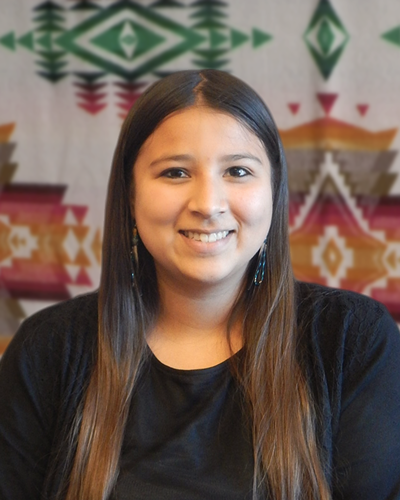“I really want my work to mean something,” Laura Sioux Roberts said. “People really need to have passion in their work for it to mean something and to have impact on the world.”
For Roberts, who is Anshinaabe from the Red Lake Nation and Dakota from the Santee Nation, that desire for passion and meaning in her work has culminated in an internship with the American Indian Cancer Foundation (AICAF).
AICAF is a national nonprofit, based in Minneapolis, that is dedicated to helping eliminate the cancer burden on American Indians through education, prevention, early detection, treatment and survivor support.
“I’m really interested in working with my own community and utilizing my skills in a way that can help myself and my community grow together,” Roberts said.
Working with the community
With such an interest in doing work within the American Indian community, it wasn’t a hard choice to apply for the health education and program evaluation internship with AICAF at the end of last summer. Roberts, a senior psychology major, said she was happy to apply because AICAF already has a strong presence among American Indians and “really brings the community together.” She had attended the organization’s annual Powwow for Hope several times in the past, which is similar to Relay for Life, but for American Indians.
She started in October 2015, and since then, has participated in several projects. She has been involved with iQuits, AICAF’s program that focuses on training clinics to help American Indians with tobacco cessation. Roberts compiled some of the information that goes out in a weekly email to the clinics.
She cited tobacco usage as one example of how using a different tactic with American Indians can be helpful.
“Tobacco is sacred to Native American people,” Roberts said. “So, when a Western, non-native foundation is talking about lung cancer, for example, they’d say you have to stay away from tobacco. As a Native American, that would be really kind of offensive and something you would shy away from. It’s a medicine. It’s something that will keep you healthy and it’s going to bring good into your life. AICAF works to distinguish between traditional tobacco and commercial tobacco, and talks about tobacco-cessation techniques that would help a Native American person move forward instead of pausing.”
Part of that work is also just encouraging native peoples to get screened. Roberts said that, American Indians often don’t discover they have cancer until they’re in the later stages because they’re not getting screened early and often enough.
She also works with the Healthy Native Foods Initiative, which supports and helps sustain healthy food systems – and native healthy foods can help reduce the risk of cancer.
AICAF focuses primarily in Minnesota, but Roberts recently contributed to a report that looked at the possibility of spreading across the United States and into Canada.
“There’s a need for national growth, and there’s a desire for us to reach the 567 tribes across the U.S.,” Roberts said, adding that in 2015, AICAF’s website was viewed by people in every state in the U.S., and its quarterly newsletter goes out to 41 different states.
Moving forward
Part of what drew Roberts to AICAF is learning about how scientific studies can exclude parts of the population, particularly women and people of color – a topic that’s been covered in some of her psychology and research methods classes.
“Most of the studies are done … on a very specific demographic,” Roberts said. “These studies and so much of psychology is based on this one certain demographic, and I really felt that it’s something that needs to be done [differently].”
But AICAF, in a way, is an answer to that problem, and helps the American Indian community to heal both literally and psychologically.
“[Cancer’s] not something that’s new to our families,” Roberts said. “Just like the rest of the world, cancer has touched our families and our communities. It’s really good to see concentrated support for our people to move forward. … Different communities have different needs.”
While Roberts has put a lot of emphasis on how she can give back to her community, of equal importance to her is how she can grow as an individual to meet her community's needs in the future.
“I’m not familiar with every tribe and tradition. I have to be intentional with how I move forward with the Native American community as a whole, for all native people,” Roberts said. “That’s also seeing where my strengths can help and where I may be bypassing, unintentionally, people.”
The care and consideration Roberts has brought with her has not gone unnoticed by her co-workers.
“She’s so well-rounded,” said Amber Cardinal, project coordinator at AICAF. (Cardinal is an enrolled member of the Mandan, Hidatsa and Arikara Nation of North Dakota, as well as Keweenaw Bay Band of Ojibwa.) “She thinks of things from a lot of different angles, so she’s been helpful with that.” She added that, “Laura’s really fun to have in the office because she brings a light-hearted spirit. She always comes in happy and with a good attitude. Her laugh is contagious.”
No matter where her next step may take her, Roberts places education – both inside the classroom and outside of it – as a high priority.
“My degree might help me move forward, but that’s not the end of my education,” she said. “And it shouldn’t be the end of my education. … If my education stops, that’s a serious symptom of something being wrong, I think.”







